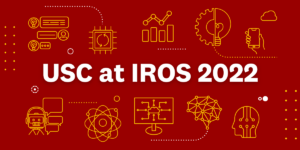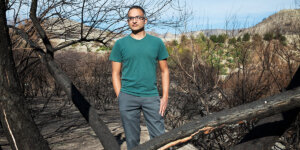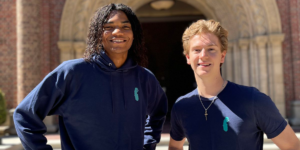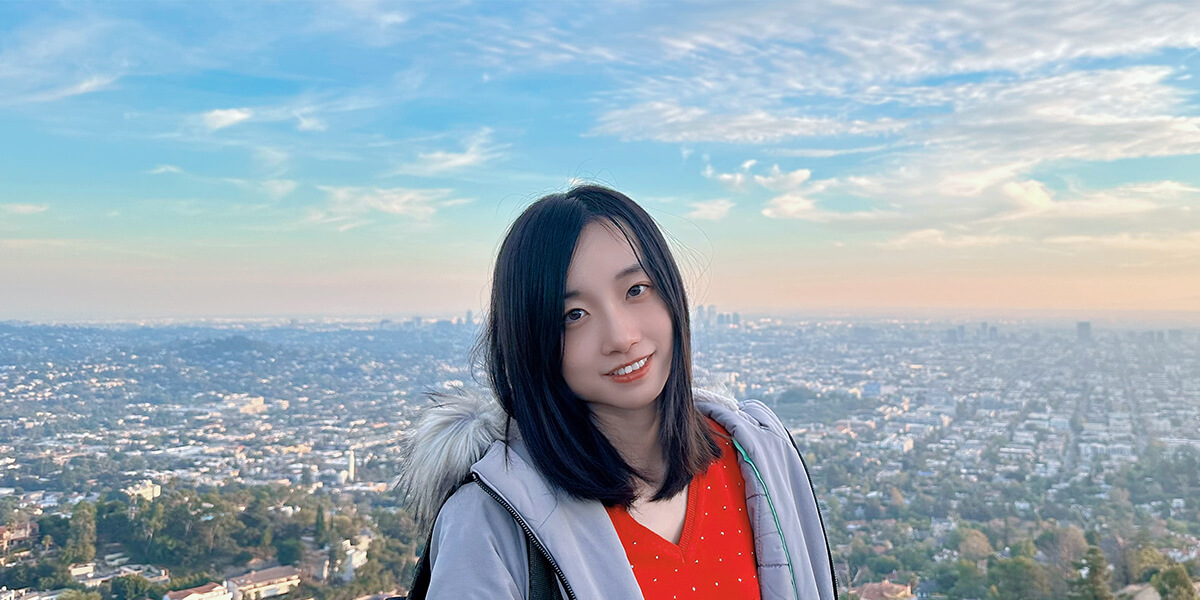
From Beijing to Los Angeles: Jiachen Zhang studies the connections between climate, air quality and society
When Jiachen Zhang (PhD ‘19) was growing up in Beijing, she remembers the yellow-grey skies of overcast mornings. She wasn’t aware that she was witnessing the effects of air pollution – particles that made their way into her memory and formed the fascination that drives her research: the interwoven connections between climate, air quality and society.
Now in Los Angeles, where Zhang has lived since her days as a USC PhD student, more often than not she rises to blue skies. That said, as an assistant professor at the Sonny Astani Department of Civil and Environmental Engineering (CEE), she’s aware that those deceiving bright blues and mesmeric multichromatic sunsets are clues to the pollution that surrounds us every day.

Jiachen Zhang presents the 2023 Innovation Committee Chair Speech for the Chinese-American Engineers and Scientists Association of Southern California
“Even on clear days in LA, we have some of the worst air quality in the United States,” Zhang reflects. “We’re far from achieving the ambient air quality standards set by the US Environmental Protection Agency for PM2.5 (particulate matter) and ozone. That said, the state of California is a leader when it comes to environmental policy – we’re the only state permitted to issue our emissions standards for vehicles (a major source of air pollutants in California), providing a model for other states to follow.”
Zhang speaks from the dual perspective of an academic and an expert in public policy. Before joining CEE, where she leads the Air Pollution-Climate-Equity Research Group, she was the manager of the Mobile Source Technology Assessment and Modeling Section at the California Air Resources Board (CARB). There she led a team of scientists and engineers to conduct research, analyze big data, develop emissions inventory, and inform new policies aimed at reducing air pollution from vehicles.

Air pollutant dispersion model estimating pollutant concentration based on emissions and meteorological variables
“We considered ourselves the ‘brain’ of the organization,” she explains, “Our research provided the data and analysis that the regulatory team would use when interacting with stakeholders and developing cost-effective policies. For instance, setting goals for manufacturers to sell electric cars, or for transportation network companies like Uber or Lyft to reduce their greenhouse gas emissions.”
Zhang brought to CARB her experience as a former research assistant and post-doc at USC, where she established and refined computational models to predict factors such as urban temperature and air quality. Her research turned out to be directly relevant to CARB’s work assessing the air quality, health and equity impacts of adopting new technologies; ultimately, her production of emissions inventories for future energy supply and consumption scenarios helped the City of Los Angeles to set its 100% renewable energy goals, along with a push for electrification.
Among her most prominent initiatives as a PhD student was a study to estimate the benefits of adopting heat-mitigating “cool” coatings on walls and roofs. By reflecting more solar radiation back to space, these new architectural elements have the potential to reduce energy consumption and manage the impact of climate change. The study led to findings that she presented to manufacturers, governmental agencies, and environmental groups, giving her a taste of how her work as an academic could have a direct impact on the built environment and public policy. The U.S. Green Building Council’s LEED program cited Dr. Zhang’s research as a basis for awarding pilot credits for the installation of cool walls.
Now, returning to academia after her experience at CARB, she brings to CEE her in-depth understanding of science-informed policy and her experience managing a team – necessary ingredients for anyone seeking to convert their research into practical, on-the-ground solutions.
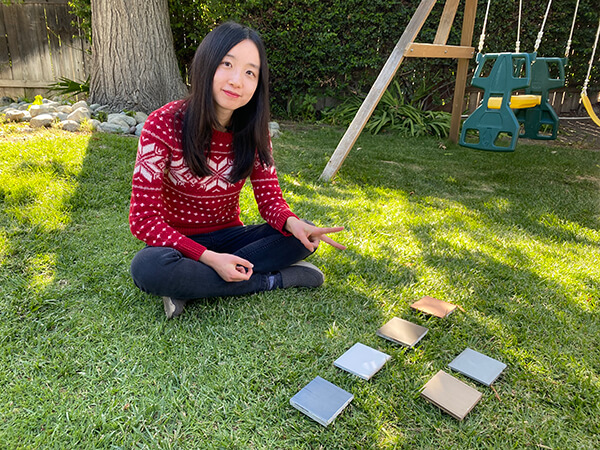
JIACHEN ZHANG WITH SAMPLES OF HIGH REFLECTIVITY COOL WALL MATERIALS”
“The Air Pollution-Climate-Equity Research Group reflects my own research objective: to better understand the interactions between climate, air pollution and society, as well as to pursue engineering methods and equitable policies to tackle climate change,” said Zhang. “I think it’s vital that students benefit from industry and policy exposure, so I regularly invite guest speakers to the classroom – including representatives from government agencies, consulting firms, and corporations. It’s a great way for young engineers to see the clear pathway between engineering fundamentals and their future careers solving real-world problems.”
Zhang’s commitment to promoting exposure and equity extends to her volunteering work. In addition to her research and teaching, she chairs the Entrepreneurship and Innovation Committee of the Chinese-American Engineers and Scientists Association of Southern California and serves as the secretary of the Air & Waste Management Association West Coast Section. She has also taken on several speaking engagements to share her journey as a female immigrant scientist and engineer.
All in all, Zhang is nothing if not ambidextrous. Her ability to thrive in different realms and manage competing demands she credits in part to her own mentor, CEE faculty member George Ban-Weiss, who passed away in 2021.
“George went above and beyond for his students. He truly cared about our personal development in addition to our academic development,” said Zhang. She remembers playing basketball with Ban-Weiss and other researchers, until he decided to leave the team in case an injury would disrupt his second career as a bass player. He truly was a “renaissance man,” who symbolized for Zhang an ideal of how to balance work and home life. Indeed, it was Ban-Weiss who offered her the post-doc position, allowing her to work from home when she had her first child.
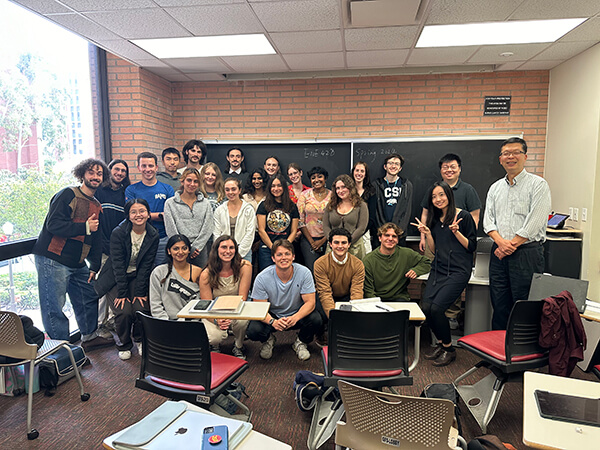
Jiachen Zhang with her class in Air Pollution Fundamentals, alongside former government colleagues, DR. XIANG LI AND DR. DAVID CHOU, who judged the final projects
Now, bringing up a young family alongside her duties teaching and leading a research group, she’s determined to orient her practice around the values that have enabled her to flourish – a life ethic of care that extends from scientific observation to interpersonal support.
In the case of CARB, that ethic involved identifying the wider ripple effects of policies upon diverse stakeholders and communities. In the case of her research at USC, it’s the meticulous process of generating new knowledge, so that future generations can breathe a little easier. As the leader of a team of researchers, it’s a keen recognition of the social infrastructure that supports a healthy academic culture.
Overall, it’s about how we care for the environment that sustains us. What we take in, what we exchange, and how to tune those interconnected systems to create a thriving, equitable society.
Published on April 29th, 2024
Last updated on May 1st, 2024





